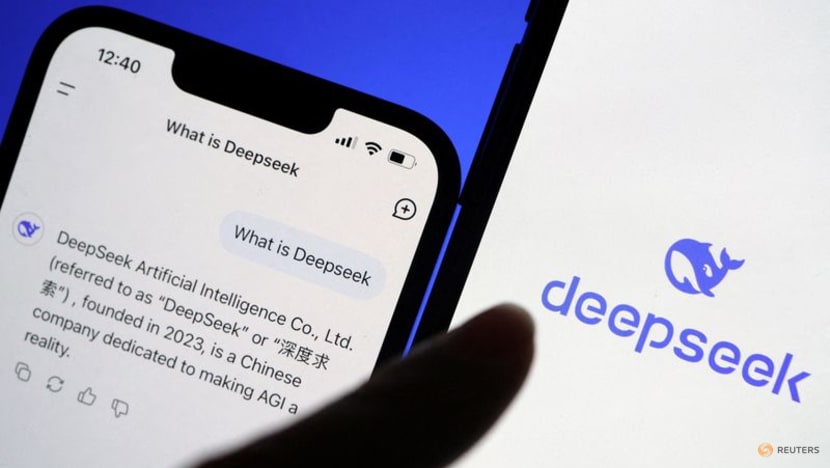CNA Explains: Are countries banning DeepSeek for legitimate reasons?
What are the main concerns, how big of a factor is geopolitics, and what are the implications for global AI and tech?

The logo of DeepSeek is displayed alongside its AI assistant app on a mobile phone, in this illustration picture taken Jan 28, 2025. (Illustration: Reuters/Florence Lo)

This audio is generated by an AI tool.
SINGAPORE: In recent weeks, several countries have moved to ban or restrict China's breakout artificial intelligence (AI) app DeepSeek-R1, citing privacy and security concerns.
The startup caused a stir in the global AI industry last month with the launch of a low-cost chatbot said to be on par with or better than existing options.
And DeepSeek said it spent only US$5.6 million to develop the model - a fraction of the billions spent by industry-leading competitors in the United States.
DeepSeek's AI Assistant eventually overtook OpenAI's ChatGPT as the top-rated free app on Apple's US app store.
That same day, nearly US$600 billion was wiped off the market value of US chipmaker Nvidia, whose semiconductors power the AI industry. It was a record one-day loss for any company on Wall Street.
Who has banned, restricted or taken action against DeepSeek?
-
Australia
Australia has banned DeepSeek on the advice of security agencies, with a government official calling it "absolutely not a symbolic move".
Government employees have been told that DeepSeek products, applications and web services pose an "unacceptable level of security risk" to the Australian government. The access, use or installation of DeepSeek products is now not allowed across government systems and mobile devices.
-
Canada
The federal government has restricted DeepSeek's chatbot from some of its mobile devices, due to "serious privacy concerns" relating to what it called the "inappropriate" collection and retention of sensitive personal information.
The government's chief information officer has said the move will ensure networks and data remain secure and protected. He said the agency in charge of the government's IT network has already restricted DeepSeek on all supported devices, with other departments urged to follow suit.
- Italy
Italy's data protection authority has blocked DeepSeek over what it called "totally insufficient" information on its use of personal data.
- Netherlands
Dutch media has reported that civil servants have been banned from using DeepSeek for work, over fears of sensitive information ending up on Chinese servers. The ban was imposed by authorities on the grounds of possible espionage, according to local media.
The Dutch Data Protection Authority had also earlier urged residents to use the app with caution.
- South Korea
South Korean authorities are blocking DeepSeek's access to work computers, after the Chinese startup failed to respond to an enquiry from a data watchdog on how the company handles user information.
A South Korean defence ministry official was quoted saying that these measures had been implemented specifically for military work-related PCs with internet. The trade ministry also said access to the app had been temporarily restricted on all its PCs.
South Korea's spy agency has also claimed that DeepSeek was "excessively" collecting personal data to train itself.
-
Taiwan
Taiwan's digital ministry has said that government departments should not use DeepSeek's AI service, given that the product is from China and thus represents a security concern.
-
US
Lawmakers in Washington have introduced a Bill to ban DeepSeek from being used on government devices, over concerns about user data security.
They called the programme an "alarming threat to US national security" and warned of "direct ties" between DeepSeek and the Chinese government.
US space agency National Aeronautics and Space Administration or NASA has already taken action and blocked access to the platform from its systems, CNBC said in a report. The reason given was that DeepSeek's servers operate outside of the US and thus raise national security and privacy concerns.
It was also reported previously that the US Navy had warned members to avoid using DeepSeek due to "potential security and ethical concerns".
On Monday, the state of New York banned DeepSeek on government devices, citing “serious concerns” over cyber threats, data privacy and safety as well as state-sponsored censorship.
Is there substance to the concerns?
DeepSeek stores user information from its cloud-hosted models on servers within China, according to its privacy policy.
Collected data include device information, IP addresses, chat histories, system language and performance metrics.
"This extensive data collection could provide significant intelligence-gathering opportunities for the CCP (China's Communist Party), which has passed multiple laws which require cooperation of private companies for national security purposes," said the Soufan Center, an independent non-profit focused on global security issues.
DeepSeek has additionally demonstrated clear censorship of topics sensitive to the CCP, the organisation added in a newsletter.
When users inquire about subjects such as Taiwan's independence, the 1989 crackdown on protests in Beijing or other topics typically blocked by China's "Great Firewall", the model systematically deflects to other topics.
"This highlights the limitations and the potential for interference and propaganda within LLMs (large language models) as knowledge hubs, a particularly useful tool for authoritarian governments to reach and influence foreign audiences," the Soufan Center wrote.
It also said that "blatant" security vulnerabilities have already emerged.
Successful cyberattacks have compromised the application, and cloud security firm Wiz has discovered an exposed database containing chat histories and sensitive information.
Cybersecurity company Palo Alto Networks also found that presently, DeepSeek is "highly vulnerable" to various jailbreaking techniques, and it's easier to bypass its safety mechanisms, according to vice president Philippa Cogswell.
This means even those with limited technical knowledge can use the tool to generate harmful content, posing a real security risk, said the managing partner of Palo Alto's Unit 42 in Asia Pacific and Japan.
Unit 42 comprises a team of experts in threat intelligence, incident response and cyber risk assessments.
DeepSeek also lacks guardrails to identify and remove inaccurate content, as well as to monitor and filter out risky prompts. These can be found in more established models like OpenAI, said Ms Cogswell.
As such, it poses a greater concern due to its "limited maturity and likely rushed-to-market release", she noted.
There are valid security concerns regardless of the country of origin of any AI tool or LLM, said Mr Benjamin Ang, a senior fellow at Singapore's S Rajaratnam School of International Studies (RSIS) think-tank.
AI tools can store their data in servers outside the country of use, and some LLMs can resurface private data in other people's conversations.
The action of banning, blocking or restricting access to DeepSeek is "prudent" for government officers because they often work on sensitive data about citizens or national security, said Mr Ang, who heads RSIS' centre of excellence for national security as well as digital impact research.
Hence, they should not be using these AI tools in their commercial or publicly available form, for writing or creating other work, he added.
How big of a factor is geopolitics?
The release of DeepSeek comes amid an ongoing US-China race for technological supremacy.
US President Donald Trump has called the app a "wake-up call" for Silicon Valley, and urged the country to be "laser-focused on competing to win".
AI is a key factor in this rivalry as it could enable China to balance out its relative lack of military experience compared to the US, said the Soufan Center.
Speaking with CNA's Asia Now programme last week, Dr Toby Walsh from the University of New South Wales (UNSW) Sydney acknowledged that "many people's concerns are because it's a Chinese company, not some other company".
The computer scientist expects a continued "fracturing" of the world into two parts.
"Companies that are happy with Chinese offerings are going to go with those, and we're going to see Western offerings (for) countries not (happy with Chinese ones)," said Dr Walsh.
"It is creating this division between how AI is going to be developed, I fear."
RSIS research fellow for future issues and technology Dr Karryl Kim Sagun Trajano said that rather than viewing DeepSeek as "merely" a Chinese company, one must also approach it as a technology startup trying to make it by challenging industry giants, mainly from the US.
While this could be good for consumers as it presents alternatives to dominant platforms, there is a need to be mindful of safety and security when using such apps, "whether they be from China, the US, or anywhere else", she added.
Deep Dive - DeepSeek: What difference will cheaper AI make?
What are the implications for global AI and tech?
Palo Alto's Ms Cogswell said vulnerabilities exposed in DeepSeek highlight a growing reality: AI models are not just powerful tools for innovation but also prime targets for exploitation.
Companies must assume that LLM guardrails can be broken, and take proactive steps with security measures, she said.
This includes monitoring AI usage, restricting unauthorised access and implementing safeguards to prevent data leaks and manipulation.
"The increasing advancement of AI and the threats they face means that continuous innovation in AI security is not just necessary; it’s imperative," said Ms Cogswell.
The Soufan Center said it was crucial to remain sceptical about DeepSeek's technical and security implications, even as the tool can be viewed as a win for the open-source AI community.
DeepSeek effectively democratises access to advanced AI technology, by making its models largely open source. This makes restriction of its use impossible to enforce, and anyone can run DeepSeek’s models on their device.
For UNSW's Dr Walsh, a lesson from DeepSeek's success is that the AI race is anyone's to win.
"It has demonstrated that the tech, the methodology, the way that the US tech companies were going about it - throwing more money, (that) whoever had the deepest pockets was going to win this race - is actually not sustainable," he said.
"You don't need the vast resources that the US tech companies have been throwing at AI. It's possible to build up your own sovereign AI capability," he said, pointing to announcements from the likes of Europe and India to build large foundational models of their own.
"It opens up the possibility for countries themselves to build something that applies to their values and … that they can trust."





















